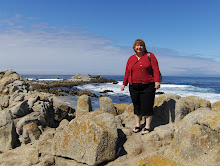
This was an amazing book!
Set in a small town in Northeast Oklahoma in the summer of 1944 - World War II era - this book is a bittersweet coming-of-age story first and a mystery second. The mystery plot is merely a stage for each of the amazing characters - especially Gretchen.
The main character is 13-year-old Gretchen Gilman who gets a summer job as a reporter at the local newspaper because all the able-bodied men are at war. The editor doesn't believe it's the place for her, but he's desperate and fair, so he gives her assignments.
Faye Tatum, the local artist and free spirit, is murdered while her husband is home on leave. Since they've recently argued and he's disappeared, everyone assumes he did it. Faye loved to dance and spent many evenings at the Blue Light, which the narrow-minded townfolk don't see as a proper establishment for a lady. This and the stories of a late-night visitor to Faye's house cause many to think the worst of her character and even blame her for her own murder. With the town talking of Faye being a tramp and Clyde being a murderer, their teenage daughter Barb is crushed amid the rumor and innuendo and the loss of her parents.
The Tatum's are neighbors of Gretchen and she wants to write a sympathetic story of Faye as told through the eyes of all the people who knew her best and loved her. This backfires and Gretchen loses friends - but her journalistic integrity never allows her to consider withdrawing her story.
Each chapter opens with a bit of the "letter from home" that Gretchen, now 50 years older and a world known journalist, received from Barb, inviting her to come home and meet with her. After the chapter introduction, all the action of the book takes place in Gretchen's memory. As the letter is opened to us chapter by chapter, so is that summer in Gretchen's life and the murder that consumed the town.
Political ambitions clash during the investigation - as the county attorney and sheriff sort through the facts. The whole town chooses sides. Gretchen, who lives with her grandmother (an absolutely wonderful character) while her mother is working in Tulsa, gets to know the members of the community as they truly are. With the backdrop of the war, food rationing, and fallen soldiers, we look through the lens of the murder investigation and see what it does to the town. We get to see the community members as she does, as they really are. The characters are varied but they tend to fall into 2 categories - ones we like and ones we don't. It is in this world of flawed adults, that Gretchen loses her childlike naive nature.
Both Gretchen and Barb left town at the end of that summer. While the town rests after the murder is "solved" - with their suspicions affirmed - the murder isn't truly solved until Barb meets with Gretchen 50 years later - long after everyone who could be affected by the truth is dead.
Letter From Home captures small-town life to the degree that we feel we personally know this town. The stress that individuals and their community endure during the separation of war are amazingly vivid. While the mystery aspect of the book is good - though I knew the ending before they told me - this book is truly a poignant memoir of a young woman during the summer she grew up
Carolyn Hart did a wonderful job with this book - the story and characters remain with you long after you close the book. I would highly recommend this book to everyone.

















